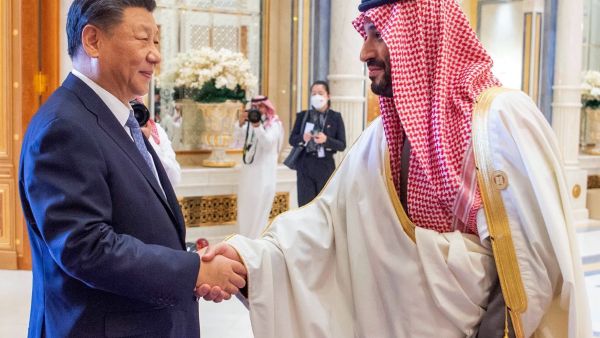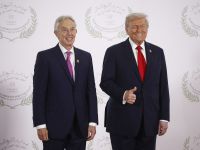The competition and conflict redefining geopolitics has led to both speculation and scorn over whether realignments are afoot in the Middle East. Developments in the last year suggest that the popular belief of MENA neutrality warrants reconsideration.
Moscow’s efforts to marshal diplomatic support for its invasion of Ukraine might seem to undercut claims of geopolitical reshuffle; despite some hesitation, a U.N. resolution condemning Russia in March was supported by Saudi Arabia, the UAE, and Egypt. But this incidence of the region rhetorically aligning with the West has proved anomalous in 2022, a year which has been defined more by tension than cooperation. This condemnation has not translated into support for Western sanctions. Like much of the non-Western world, MENA states are not moved by and even deeply suspicious of Western efforts to preserve a rule-based order.
Like much of the non-Western world, MENA states are not moved by and even deeply suspicious of Western efforts to preserve a rule-based order.
High-minded Western words about ideas of democracy and freedom are far less appealing to MENA autocracies than the respectful and predictable indifference of Russia and China with accompanies their rich relations; the anti-Westernism which courses through the region is shared by its regimes too, ever indignant at the meddling in and criticism of their internal affairs by Western countries.
The controversy surrounding OPEC has led to the further perishing of US-Saudi Arabia relations. In Washington today, there is considerable animus towards Riyadh since it took a collective decision with its OPEC counterparts to raise global oil prices by announcing its largest supply cut in years – coolly rebuffing the pleas by the Biden administration.
Consequently, there is now a growing and plausible view in the US that Saudi Arabia is no longer an ally given its decision to blunt the punitive action of the West against Russia. As the shadows of competition are thrown further across the Middle East, policy makers on both sides of the geopolitical division are carefully observing the initial reactions of regional regimes when taking stock of their friends and adversaries.
“It’s clear that OPEC+ is aligning with Russia” retorted a wounded White House when the decision was taken in October, directing the criticism at its long-standing ally in the Gulf. Suggestions that Saudi Arabia may be sidling up to Russia on a political footing has been treated with scorn by commentators, whose main criticism is that this position is too binary.
“The Saudis weren’t thinking about Ukraine – like many people in Asia and Africa, they don’t think in absolute terms of being pro- or anti-Russian,” wrote Hussein Ibish, senior resident scholar at the Arab Gulf States Institute in Washington.
The desire to engage more with organisations like BRICS, so the argument proceeds, does not amount to a rejection of the West but represents the desire of Riyadh (and Cairo, Ankara, and Algiers) to strategically plant its feet on both sides of the geopolitical divide. By doing so, MENA states seek to maximise the benefits of geopolitical competition, minimise its consequences, and evade its constraints. There is a popular perception that every time the US does not get its way in the Middle East, Washington vainly misreads this as a snub; that the US fails to understand that decisions and policies can occur with little consideration of it. And there is some truth to this view.
However, the divergences between the US and MENA states on vital issues in US foreign policy are stacking up. Whatever the intentions, the action of MENA countries in OPEC+ is not neutral; on the contrary, they have adopted a policy supportive of Russia on the defining geopolitical issue of 2022. And on other key divisions of contemporary geopolitics – like sovereignty in Taiwan – Arab governments have embraced Beijing’s position.
As the shadows of competition are thrown further across the Middle East, policy makers on both sides of the geopolitical division are carefully observing the initial reactions of regional regimes when taking stock of their friends and adversaries.
Now with tacit support for Russia through OPEC in the Gulf, in addition to support for China’s repression in Xinjiang and Hong Kong, the Middle East is sharply opposed to the US and wider West on many of the essential geopolitical issues of today and tomorrow. Only this month, President Xi was honoured by Arab leaders in Saudi Arabia, serving as further evidence to some that MENA states are eyeing alternatives to the “liberal world order,” regarding China’s authoritarianism as a more natural ally given their own politics.
the Middle East is sharply opposed to the US and wider West on many of the essential geopolitical issues of today and tomorrow
Saudi officials insisted that the generous reception of Xi is perfectly suitable for a state as powerful as China; yet its timing brimmed with geopolitical symbolism and was credibly seen as a rebuke to the US given its contrast with the wintry welcome which met Biden in July. Talk of neutrality and the need to avoid simplifications may prevail for the time being in policy chatter, but the sense of striking geopolitical change – even realignment – in the Middle East is gathering credibility; and its definition and implications will grow as the geopolitical crises of the 21st century continue to fall thick and fast.









